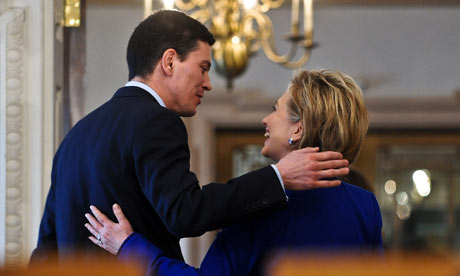Out of politeness perhaps, or in search of a cure for insomnia, I’ve been asked several times to write a diary about current UK politics. That would be great if you’re fascinated by the sight of paint drying, grass growing, or traffic lights changing…

But fortunately yesterday, for her first foreign meeting with a European equivalent, Secretary of State Hillary Clinton chose to meet David Miliband, the fresh-faced UK Foreign Secretary and said.
“It is often said the United States and Britain have enjoyed a special relationship. It is certainly special in my mind and one that has proven very productive,”
Of course, as is the way of these things (i.e. the relation of poodle to master) David Miliband couldn’t help changing the article, when he averred the he wanted to:
“renew and refresh the special relationship”
It makes sense. For a medium sized power, there’s nothing so reassuring at night than to feel you have a special definite alliance with the superpower. In fact, I would say that the principle of British foreign policy since the Suez Crisis of 1956 till the Iraq invasion: “It’s better to be wrong with the Americans than right with anyone else…”
There’s no doubt, because of language, history, common law, culture, intermarriage, James Bond, Hollywood and Pop Music, there is a special relationship between the UK and the US. However it is as fraught with many dissonances as congruities. We often assume we have a common culture and will get along (check out Madonna and Guy Ritchie) only to discover that these two cultures are wildly different. On many many levels, from economic structure, government intervention, social policies towards Gay marriage or abortion, attitudes to the role of religion and general church attendance, Britain is firmly European, and has more in common with foreign speaking cheese/salami/bratwurst eaters than our former colonial friends. There are many historians from this side of the pond, like Niall Ferguson, who argue the transatlantic rift is widening, much faster than the slow shift of tectonic plates.
However, at the end of her meeting with Miliband (which was quickly followed by another tete-a-tete with the German foreign minister) Hillary Clinton apparently did slip into something more definitive:
It is a Washington ritual: when a British leader visits, he or she feels obliged to mention “the special relationship”.
But in reality there is no such thing. Britain is no more important to the US than Germany or France. Americans, anxious to avoid upsetting their other allies, steer away from referring to “the special relationship” and speak instead of “a special relationship”.
At least until yesterday, when Hillary Clinton showed her inexperience and, in her final remarks, uttered the words “the special relationship” at a press event with David Miliband.
Oops. Personally I think other countries might have primacy in special relationships: Canada, Mexico or Israel perhaps. But thanks for the thought Hillary, and since there is a close military alliance between US and UK military forces, especially now in Afghanistan, I understand the slip.
From the British point of view, my guess is that we love and resent US power, influence, and cultural reach almost as much as the French. There’s certainly a knee jerk Anti-Americanism in both popular and intellectual life which figures like Reagan and Bush bring to the fore. My former American partner was unlucky/lucky enough to teach US foreign policy at Cambridge around the time of the Iraq invasion of 2003, and would describe her job as ‘spear catching’.
But unlike the French, underlying this resentment at big brash rich clumsy big brother was an underlying family affinity. Certainly, since taking office, Obama’s has helped the USA’s approval ratings shoot up to unprecedented levels.

Perhaps figures like Roosevelt, Kennedy and Obama – who seem to look outward rather than inward, reassure us we won’t be forgotten. Or perhaps they reflect a genuine fear of US isolationism and unilateralism.
We are due a General Election in the next year or so, and quite how this will pan out with a change of UK government I don’t know. Blair, who got on famously with Bill and Hillary, also managed (unfortunately) to find some kind of fellow spirit in George W. Since, for many reasons (including our economically disastrous dependence on financial services and the City) the next Government is unlikely to be Labour, it will be interesting to see how a Conservative administration will deal with a Democratic president.
If the noises made as long ago as last summer by the Tory Leader David Cameron are anything to go by, Obama will be cited as an inspiration by Conservative as well. This might seem bizarre, but Tories have always been passionate about alliances with the US since you’ve had all the big guns, and since British conservatives are well to the left of American Republicans on most social and economic issues (even to the left of many Democrats) this is not such a stretch.
As Andrew Sullivan is constantly pointing out, the centrist pragmatic Burkean form of politics we call Conservatism has a lot in common with Obama’s style.
But one area, I think, will be problematic: economics and the relationship with Europe as a whole. The danger of too close a US/UK lovefest has always been, in my mind, the idea that we could somehow sail away from Europe, moor our Islands somewhere off the coast of New England, and become an extra Nafta member, or 51st State. Anti European Tories are always mooting this, and such Anglo American fanaticism was the real reason for Thatcher’s downfall. We love the US, and UK companies have intensive and extensive investments, but Europe is the main trade partner by far, and our social moraes, the structure of our societies and cities, is visibly European and has always been so.
While our economies drift further apart, we are met with the paradox that on a tactical and strategic level, US and UK forces are even more intertwined. The various elements of the British Army, Royal Air Force and Royal Navy, comprise one of the few remaining national armed forces able to project power abroad (with US airlift). Most other European armies are static and defensive. Their capabilities don’t gel with US communications, posture or aggressive kinetic techniques. British forces do, and whether Conservative or Labour, it seems that both sides like it that way.
So perhaps this is the special relationship, at least in military terms – but having rambled through the options, I’d love to hear what the Moose thinks.
48 comments